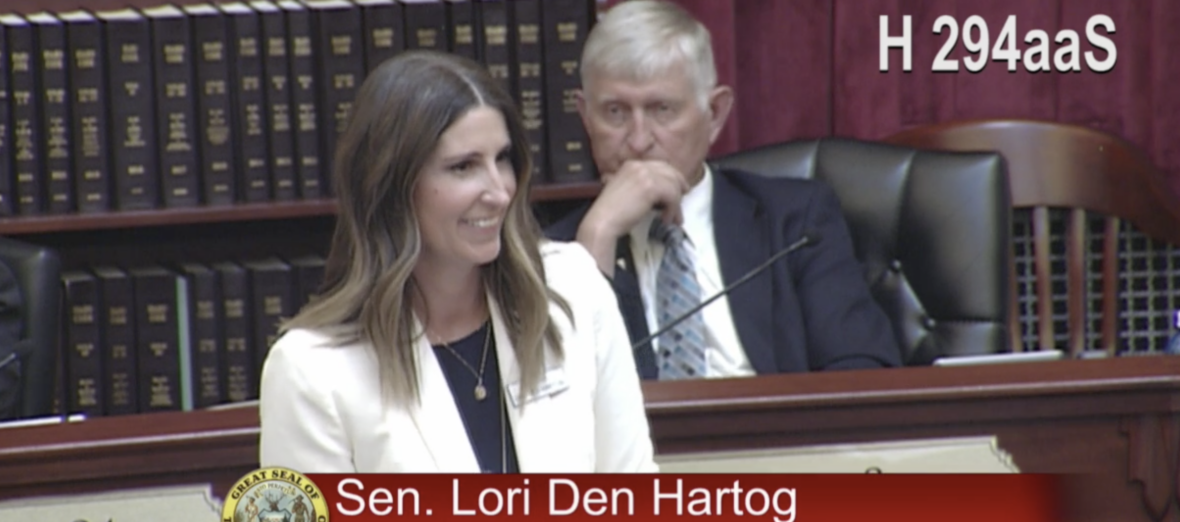Don’t let the labeling throw you.
When the Senate debated the Strong Students grant bill this week, lawmakers really debated private school funding.
And the debate sent a clear message. Lawmakers are reluctant to put public dollars into private schools. Even in one of the nation’s most conservative state capitols. Even after an unprecedented year of turbulence in the classroom. Even as the state is sitting on a historic surplus, bolstered by a massive infusion of federal dollars.
For advocates of private schools and education choice, the week was a setback and, perhaps, a missed opportunity.
The sponsors of House Bill 294 pushed the school choice envelope. As originally written, their bill would have allowed parents to use state- and federally funded grants for private school tuition and fees, and it would have set up a private school scholarship program for low-income households. They later agreed to remove the scholarship proposal from the bill, and the amended version died on the Senate floor Tuesday.
The whole thing was packaged as a followup to Strong Families, Strong Students, Gov. Brad Little’s plan to use $50 million in federal coronavirus stimulus money to help parents offset the cost of online instruction. Little’s program proved widely popular. By the end of 2020, the state awarded grants to more than 18,000 families, helping more than 81,000 students.
Little wouldn’t comment this week on the namesake bill — which means he also was silent on the idea of offering private school tuition grants. But before they voted down HB 294, several senators made it clear that they weren’t buying into the Strong Students labeling.
“This bill, while it has the same name, is a very different animal,” said Sen. Carl Crabtree, R-Grangeville.
The difference could be found in the one line that would have allowed parents to use a $750 grant for private school tuition. And Tuesday’s debate centered on that one line.
Pushing back against the education groups that opposed HB 294, the bill’s Senate sponsor reminded colleagues that parents don’t have lobbyists at the Statehouse.

“The system does not know the individual needs of every student. But parents do,” said Sen. Lori Den Hartog, R-Meridian. “We can be their voice and we can be their advocates.”
Her argument very nearly prevailed — and HB 294 could easily have passed the Senate, if not for some questionable parliamentary strategy.
The Senate voted down HB 294 on a 16-18 vote. But one of the 18 opponents was Sen. Christy Zito, a Hammett Republican. She used a parliamentary rule in an unsuccessful attempt to convince the Senate to reconsider HB 294 — and ultimately pass it. But in order to play that procedural card, she had to vote on Tuesday’s prevailing side, with a no vote.
Had Zito simply voted yes in the first place, the Senate would have landed in a 17-17 deadlock, giving Lt. Gov. Janice McGeachin a rare tie-breaking vote. McGeachin’s office didn’t respond to inquiries about HB 294, but it’s hardly a stretch to think that McGeachin would have voted in favor of the bill. That would have sent the amended bill back to the House, where it most likely would have passed a second time.
That’s how close the vote was.
But can the Legislature simply pass a law supporting private school funding? It isn’t that simple.
Like some three dozen states, Idaho has a so-called “Blaine Amendment” in its Constitution, prohibiting the use of public funds to support any religious school.
In a March 12 opinion — sought by Rep. Sally Toone, D-Gooding — Deputy Attorney General Spencer W. Holm said HB 294’s original private school grant and scholarship proposals represented a “public purpose,” and were likely constitutional.
During Tuesday’s debate, two of the Senate’s in-house attorneys took opposite sides of the Blaine Amendment issue. Citing a June U.S. Supreme Court ruling, opening a Montana private school scholarship program to religious schools, Caldwell Republican Jim Rice said the ruling essentially rendered Idaho’s Blaine Amendment unconstitutional. Boise Democrat Grant Burgoyne said the ruling did no such thing; instead, it said that once a state subsidizes private schools, it must offer the same subsidy to parochial schools.
Typical day at the Senate, really. Rice and Burgoyne argue opposing sides of a nuanced legal issue so often that it’s actually noteworthy when it doesn’t happen. All of that notwithstanding, the Blaine Amendment has been a daunting obstacle to school choice advocates for years.
And amending the Blaine Amendment? That’s a tall order. It takes a two-thirds vote in both houses to propose a constitutional amendment, which then requires voter ratification. The House passed the original version of HB 294 with two-thirds support. But Tuesday’s Senate vote doesn’t exactly bode well for passing any kind of Blaine Amendment rewrite.
An attempt to work around the Blaine Amendment, HB 294 ran into fierce opposition from education lobbying groups who called it an end-run voucher program. It also ran into skepticism from lawmakers who were worried about precedent, and worried about diluting education dollars.
“Our Constitution does say that we have a duty to public schools. It does not say we have a duty to fund private schools,” said Sen. Jim Woodward, R-Sagle. “It is a change which I think requires more conversation.”
School choice advocates came close this session.
But they also couldn’t have asked for a better opening.
Each week, Kevin Richert writes an analysis on education policy and education politics. Look for it every Thursday.
